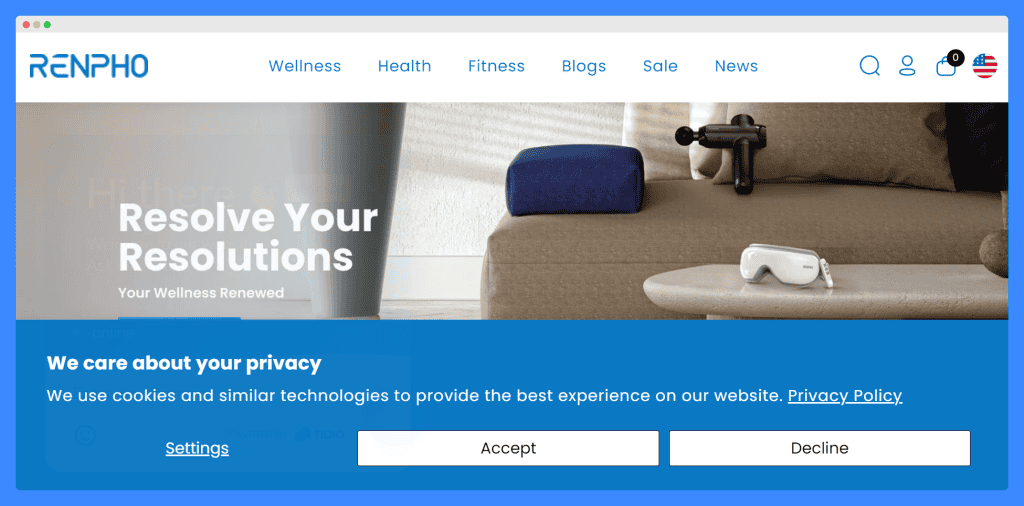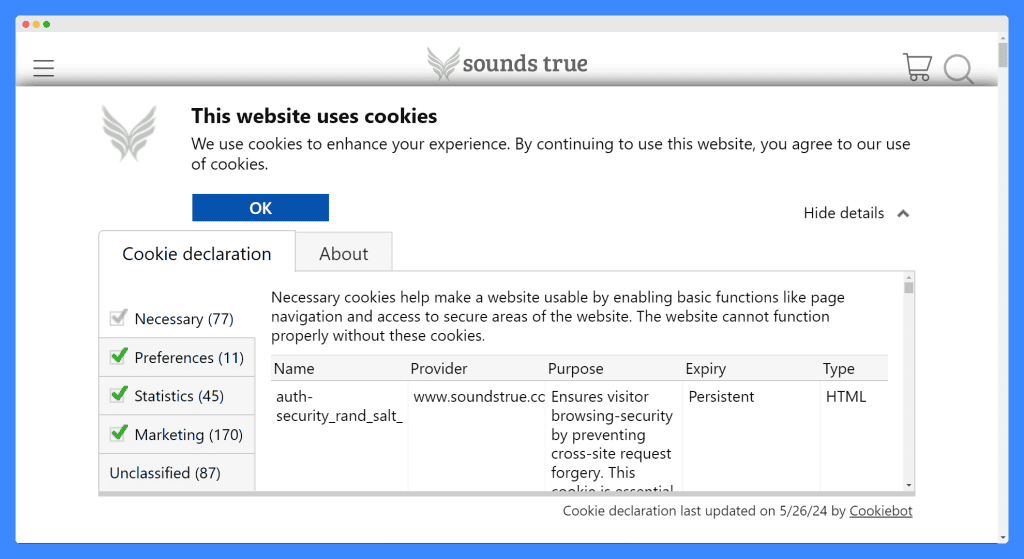To be a successful online business owner involves understanding various regulations, including cookie banner requirements. But what is a cookie banner?
A cookie banner is a pop-up on your website that informs visitors about your use of cookies and asks for their consent to store these on their devices.
Also known as a cookie consent notice, this tool is important not only for enhancing transparency but also for compliance with privacy laws like GDPR, CPRA, and CCPA.
Below, we’ll talk about the specific cookie banner requirements under these regulations and how to ensure your online business is compliant across the globe.
- Complying with regulations like GDPR, CCPA, and CPRA protects your business and builds trust with users by giving them control over their data.
- Cookie consent laws vary by country. The EU’s GDPR requires explicit opt-in consent, while the US has state-by-state regulations. In Canada, achieving “meaningful consent” is key under PIPEDA.
- Even if a country doesn’t mandate cookie banners, transparency is key. Inform users about the cookies you use and their purposes.
Table of Contents
Does Every Site Need a Cookie Banner?
No, no every site needs a cookie banner. It depends on the website cookies law relevant to the site’s audience and operations.
With that said, sites that collect personal data through cookies to serve users in regions with specific cookie consent requirements will need to implement a cookie banner.
Moreover, while not all websites are legally obligated under a specific privacy regulation to feature a cookie consent banner, there are significant benefits to having one.
For instance, it promotes transparency by informing visitors about the use of cookies and their rights regarding personal data.
Additionally, it prepares businesses for potential legal requirements and enhances the user experience by aligning with best privacy practices.
Having a cookie consent banner isn’t required, but it can improve user experience and help maintain a positive reputation in an increasingly privacy-conscious world.
Cookie Banner Requirements Under Different Countries You Should Be Aware Of
Each country has its own set of guidelines on what a cookie banner must include.
To make sure your website remains compliant no matter where your users are located, here are the specific cookie banner requirements across various jurisdictions:
GDPR Cookie Banner Requirements for the EU
The General Data Protection Regulation or GDPR doesn’t explicitly mention cookies, but it applies to any situation where user data is collected online. This makes it relevant for websites that use cookies to track user behavior.
The EU also has the ePrivacy Directive, sometimes referred to as the EU cookie law, which works alongside the GDPR to regulate the use of cookies.
To ensure your website has a GDPR-compliant cookie banner, consider the following:
- Article 12 (Right to Access): This grants users the right to access information about the data being collected, including the type of cookies used.
- Article 13 (Right to Information): This requires website owners to provide clear and transparent information about cookie usage, including what types of cookies are being used (e.g., necessary, functional, analytics, marketing) and the data each type collects.
- Articles 15 and 16 (Right to Rectification and Erasure): These articles give users the right to request correction or deletion of their data, which can extend to cookie data.
- Article 18 (Right to Restriction of Processing): Users have the right to restrict the processing of their data, which can include opting out of certain cookie types.
In short, to be GDPR compliant, a cookie banner should reflect these principles by providing clear information about the types of cookies the website uses, their purposes, and how users can manage their cookie preferences.
PRO TIP: To avoid fines, ensure your GDPR cookie consent banner allows users to consent or reject cookies with a simple action.
Here’s an example of a good and straightforward cookie consent banner from Renpho:

Not only does it comply with the GDPR by informing visitors about the use of cookies and similar technologies but also allows them to accept or decline its use.
U.S. Cookie Banner Requirements
Navigating cookie banner regulations in the U.S. can be complex due to varying state-level data privacy laws. Each state has distinct requirements regarding the management and disclosure of cookie use.
Understanding these nuances ensures your website remains compliant across different jurisdictions.
California Privacy Rights Act (CPRA) Cookie Banner Requirements
The CCPA, with its recent amendments under the CPRA, requires businesses to disclose their use of cookies and the categories of personal information collected through them. This means a cookie notice should include:
- A clear description of the different cookie categories used on the website (e.g., analytics, advertising, social media)
- The purposes for which the data is collected
- User options for opting out of the sale of their data (if applicable)
Virginia Consumer Data Protection Act (VCDPA) Cookie Requirements
The VCDPA grants Virginia residents similar rights to access, correct, and delete their data.
While the law doesn’t explicitly mandate a cookie banner, it emphasizes the need for clear communication about data collection practices, including cookie use.
In short, businesses operating in Virginia should ensure their cookie notice provides transparent information about cookies and user control options.
The Connecticut Data Privacy Act (CTDPA) Cookie Banner Requirements
Similar to the CCPA and VCDPA, a compliant cookie banner under the CTDPA should provide clear information about the types of cookies used, the data collected, and how users can exercise their rights regarding their information.
Here is an excellent example of a cookie banner that complies with these requirements:

Here, Sounds True offers a list of the different types of cookies its website uses and what each of their purposes are. The cookie consent management platform is also easily accessible through its pop-up banner.
PIPEDA and Canada’s Cookie Banner Requirements
The Personal Information Protection and Electronic Documents Act (PIPEDA) is Canada’s federal privacy law for private-sector organizations. It sets out the rules for how businesses must handle personal information in the course of commercial activity.
While PIPEDA itself does not specifically mention cookies, it covers the collection, use, and disclosure of personal information, which can include information gathered through cookies.
Compared to the GDPR’s detailed requirements or the opt-out cookie focus of the CCPA, PIPEDA offers more flexibility. However, achieving meaningful consent still requires a user-friendly and informative cookie banner.
Under PIPEDA, organizations are required to obtain an individual’s consent when they collect, use, or disclose that individual’s personal information. The consent must be informed, meaning that individuals should be aware of what they are consenting to.
UK Cookie Banner Requirements
The UK’s approach to cookie consent falls somewhere between the comprehensive GDPR and the principle-based PIPEDA.
There’s no single law solely focused on cookies, but the Privacy and Electronic Communications Regulations (PECR) regulate how electronic communications, including cookies, are used.
Here’s a breakdown of the specific requirements for cookie use in the UK:
- Clear and Transparent Information: The cookie banner must provide users with clear and comprehensive information about the types of cookies used on the website, their purposes, and how long they store data.
- Freely Given Consent: The banner should obtain freely given consent from users. This means avoiding pre-checked consent boxes and ensuring a clear distinction between “accept” and “reject” options.
- Right to Withdraw Consent: Users must have a straightforward way to withdraw their consent at any time. This could involve a link to cookie settings or a clear explanation within the banner itself.
- No Cookie Wall: Websites cannot deny access to their content if a user refuses to consent to cookies, except in cases where cookies are strictly necessary for the website’s functionality.
PRO TIP: A notice-only cookie banner example without offering a way to opt out wouldn’t be compliant. Make sure you give users clear control over their cookie preferences.
Australia Cookie Banner Requirements
Australia’s approach to cookie consent is unique. Unlike the GDPR or US state laws with specific requirements, Australia’s Privacy Act 1988 and the Australian Privacy Principles (APPs) don’t mandate cookie banners.
However, if your website collects sensitive personal information (like health data or financial details) through cookies, you’ll need to obtain consent from users before processing and storing this data.
This might necessitate a cookie banner requesting explicit user permission for specific cookie categories that collect sensitive information.
In the example below from BH Cosmetics, the opt-out cookie banner text clearly provides users with control over their cookie preferences.

In addition, it also includes a link to the cookie policy, allowing visitors to get the full picture regarding how the site uses cookies and similar technologies.
PRO TIP: To make sure your cookie banner complies with all relevant laws and regulations, use a trusted cookie banner generator designed for this.
Frequently Asked Questions
When should a cookie banner appear?
A cookie banner should appear as soon as a user enters a website to ensure immediate compliance and transparency. This timing is crucial for the effectiveness of a cookie banner.
Are cookie banners required by the CCPA?
The CCPA does not explicitly require a cookie banner on your website. However, it mandates disclosure of information practices, which a cookie banner can effectively fulfill.
What are the requirements for a GDPR cookie banner?
To comply with GDPR, a cookie banner must explicitly request consent and provide an option to reject non-essential cookies.
Are cookie consent banners legally required?
Cookie consent banners are a legal requirement in the EU under GDPR and in regions with similar privacy laws. They ensure user consent for data tracking.
Do I need to list the cookies’ privacy policy?
Yes, it’s advisable to list cookies in your privacy policy to inform users about their use and purpose.
Where is the best place to put a cookie banner?
The best place to display an opt-up cookie banner is at the bottom of the screen where it is visible but not intrusive. This allows easy access for users to manage their preferences.
What happens if you don’t have a cookie banner?
If you don’t have a cookie banner, you risk non-compliance with laws that require it. Businesses must implement a cookie banner to avoid legal penalties.



